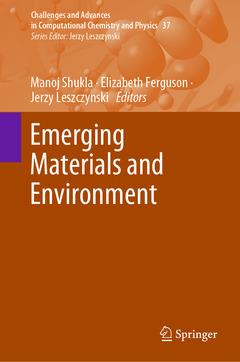Emerging Materials and Environment, 1st ed. 2024 Challenges and Advances in Computational Chemistry and Physics Series, Vol. 37
Coordonnateurs : Shukla Manoj, Ferguson Elizabeth, Leszczynski Jerzy

Date de parution : 10-2023
Ouvrage de 324 p.
15.5x23.5 cm
Thèmes d’Emerging Materials and Environment :
Mots-clés :
Materials and Environment; Multiscale materials modeling; Computational materials modeling; QSAR/QSPR; Life-cycle assessment; Fate and transport; Materials development; Materials for environmental remediation; Environmental impact of materials; Environmental remediation; Dredged materials environmental impact; Environmental contaminants; Environmental hazards; Advanced materials; Emerging materials; Additive manufacturing; Innovative Materials; Multifunctional materials; Novel materials; Environmental sensing



